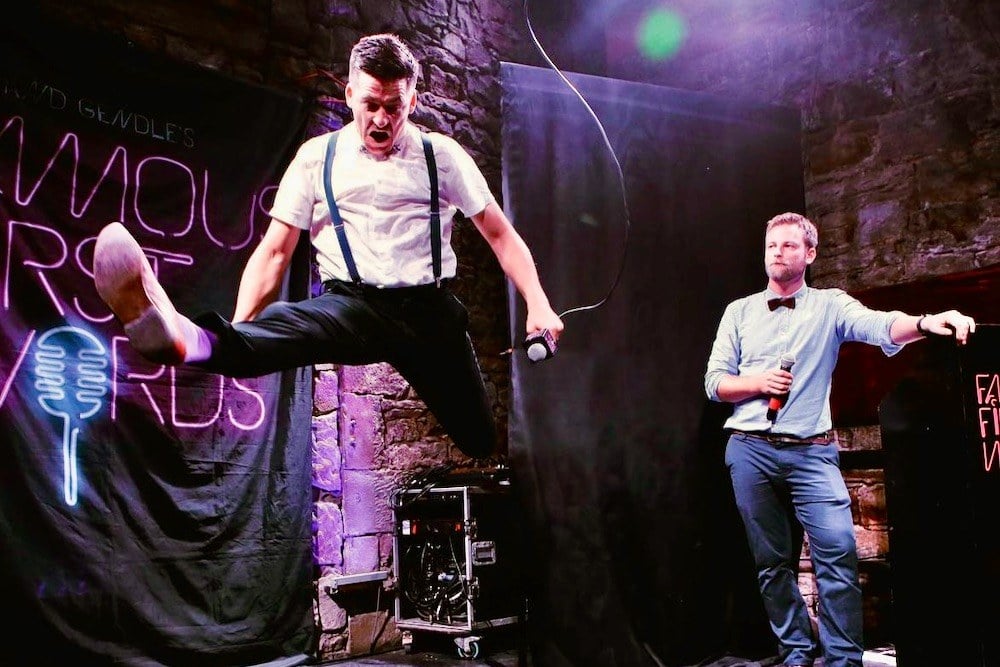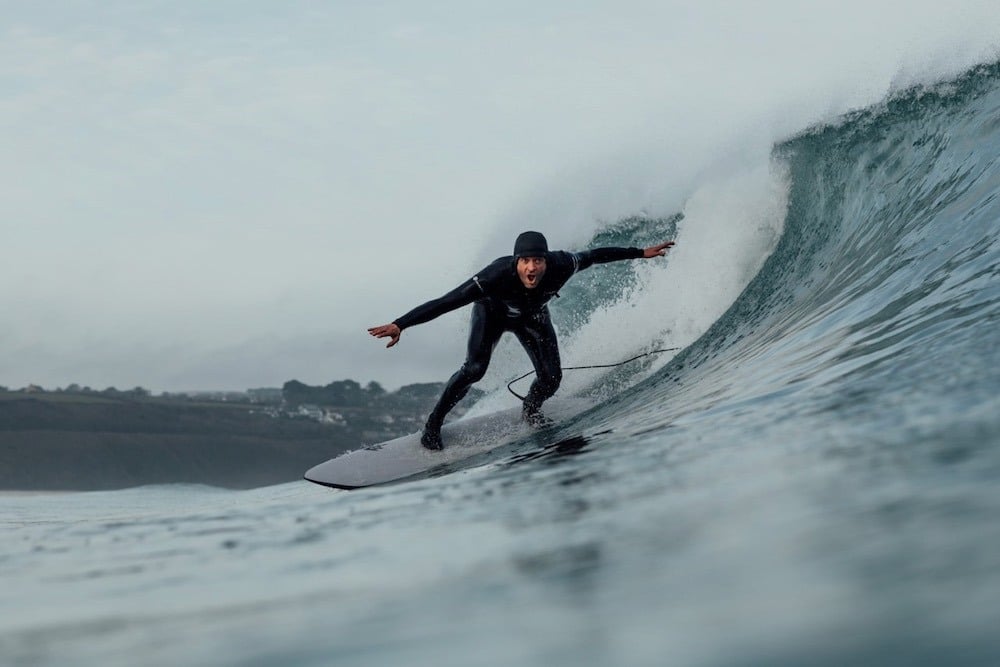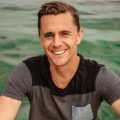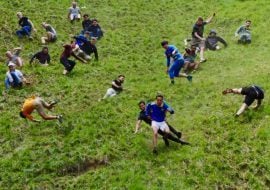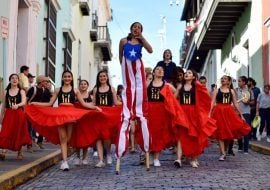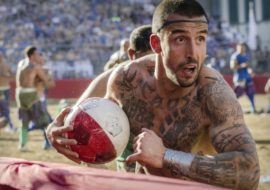Running the World: Nick Butter


Episode 14: Podcast with Nick Butter, a British Endurance Athlete and World Record Holder for Running a marathon in every country in the world
In this episode Oli Russell-Cowan chats to Nick Butter, the first person in history to run a marathon in every single country in the world. Nick completed 196 marathons in all 196 countries in less than 2 years. That’s 3 marathons a week, every week!
8 years ago Nick decided to quit his office job and entered the world of running and adventure. He is fascinated by the crazy things, the things no one else does.
Nick crossed the finish line after 674 days with a few friends and hand in hand with Kevin. The two met at Marathon Des Sables a few years ago. Kevin has prostate cancer but keeps running until he physically can’t. He is Nick’s inspiration for this incredibly physical and mental challenge. Finishing his journey after 2 years Nick raised over £100,000 for Prostate Cancer UK.
Tune in for some of Nick’s best running and travel stories, worst moments and how he got fit to run 3 marathons a week.
Listen to the podcast:
Dive in and listen to this episode on Apple Podcast and Spotify.

Read the transcript:
Oli Russell-Cowan: Hi guys, it’s Oli from Rad Season I’m joined today by British endurance athlete Nick butter who has completed an amazing feat of running a marathon distance in every single country in the world that’s 196 countries, which is absolutely incredible.
Nick, thanks for coming on the show today.
Nick Butter: No, thank you very much for having me it’s a pleasure.
Vanlife

Oli: Whereabouts are you at the moment?
Nick: I am down south I live in a van so I’m by the seaside whenever I can. Every time I gravitate towards the beach and the ocean. I’m in the UK down in Cornwall trying to soak up as much of the sun and the sea as possible.
Oli: How’s it been going down there? What’s the situation like?
Nick: I was down here for quite a bit locked down. I was mid-tour when we got locked down and so down here was completely dead. Now it’s the absolute opposite it’s very, very busy.
Over the last couple of weeks, I actually had a bit of a mild panic that I might have had the dreaded COVID. But I went and got tested a couple of days ago and I don’t. So it was a little bit of a scare, but I’m all good now.
There’s a lot of people out and the sun is shining, good waves, had a little bit of a surf did my morning run with another chap who actually been following my journey and happened to pull up in his van alongside me. So we met and said hello and went for a run in the morning with the Dog.
I’m just trying to fit in as much of my downtime as possible before everything gets a little bit mental again when the world properly restarts itself.
Oli: Good stuff. Are you mixing between running and surfing?
Nick: It’s running. The running is always gonna be the main thing. Surfing for me, I’m absolutely rubbish, I’m terrible. But I love to be in the water and spending time with my brother and my family as well.
I’m actually supposed to be in Malawi at the moment, doing my next mini-expedition running north to south of Malawi. But that’s happening potentially now later in the year or even next year, depending on what happens. They have a new president coming in and he’s just completely locked stuff down even further. So there’s a potential that we’re swapping it out and by the end of the month, I might even be doing a little bit of something else. So we’ll see.
Oli: Nice. Why did you pick Cornwall? Have you got family down there?
Nick: I’ve had a couple of apartments down here. I’ve always been here, it’s basically home now really.
‘We live in a van you can be any way you like so why not be by some of the best features.’
I’ve got friends all over the place here and especially because of my little puppy Poppy, I’ve made lots of great running with dogs friends. So yeah, this is home now really, it’s weird because I don’t really have a fixed home now I can be anywhere.
If it wasn’t for the lockdown I’d been in, or if it wasn’t the COVID I’d be in Malawi. If I wasn’t going to be in Malawi, I could fly probably be in Bali. So this is kind of like the substitute.
Growing up running
Oli: I’d love to take it back to where you grew up and how you got into running. How did that all begin?
Nick: My old headmaster of my middle school, famously said that I was not a natural runner. In my school, he was a headmaster, but also did my PE. He said, you’re really not a natural runner, and it’s probably very right. But I was definitely persistent and determined with it. I was always pretty good at cross country.
I’m always winning that and so I definitely feel like I’ve got sport in there but I grew up in the countryside. I grew up in Dorset, Cranborne a tiny little village in the middle of nowhere. Getting to my friends, I’d have to cycle to see them and I had to cycle to go to school as well. That 45-minute cycle every morning and every evening or 10 mile run every now and then if I didn’t cycle it. That then started to kind of unbeknownst to me created some endurance within me.
British Ski Team
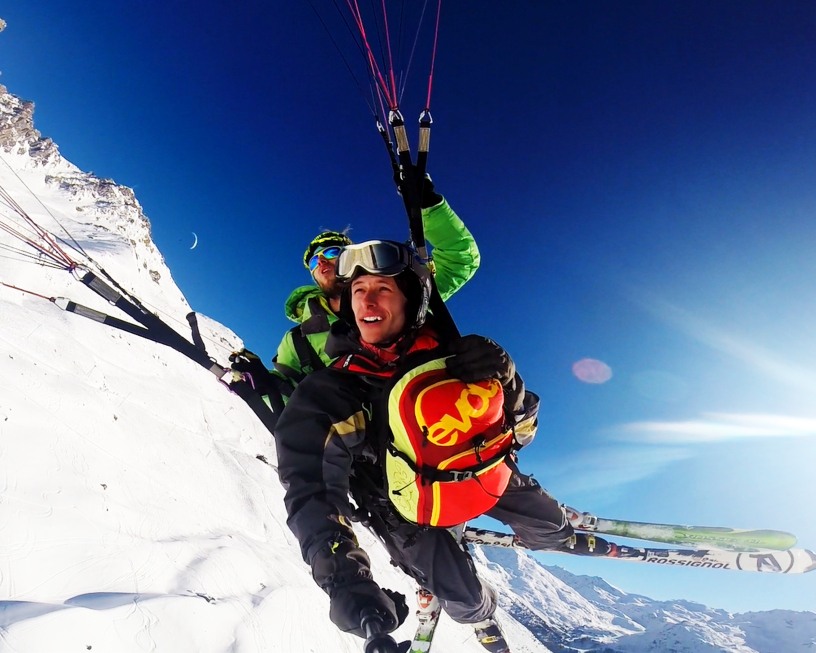
Running really wasn’t in my day to day at all until my 20s. I got out of school and then I was very fortunate to be in the under 19 ski team at Snow Sports England. Therefore I was actually doing a lot of skiing and skiing was my love and my life. Everything I did was for skiing.
Then I had the voice of my parents on my shoulder telling you should probably get a real job because that’s not going to pay you any money and it’s a young man’s game. They were very right.
Running and the corporate world
But at the same time, I still love skiing and it was very difficult to not do that. Then I eventually got a job in finance in banking, which was not me, but it earns some money. Therefore I made that my world for a little while. Far too long probably about eight years. In that period, I just started to run more.
‘I was running I think, as a lot of people do for therapy’
I wasn’t necessarily very good at it, I started to run longer distances, you start to kind of race yourself against your own times and start to get better you start to then read some blogs and read some forums and get some magazines. Then you know, one thing leads to another and I had an opportunity to win some good races and finishing really highly in a lot of ultras. Therefore, I had some brands approach me and say, would you like to go into this race and that race? Would you like to go to another country and run with us and I had to turn those down because I was working and that meant that I couldn’t run.
Marathon Des Sables

I thought, you know what, that’s not right. I need to make a change. It took me a good three years from realizing that to then being out in the desert, the Sahara desert. I was running the infamous Marathon Des Sables, which is a seven-day race through the 54-degree heat with about 1000 people running through the Sahara Desert. I met this guy, Kevin, and Kevin was 50 at the time.
He was the moment that kind of pushed me over the edge. I’ve had a lot of people in my life that kind of pushed me to that cliff of adventure and they wanted me to go and do something that was slightly different and Kevin was kind of the real big shift towards the end. Kevin had terminal prostate cancer and he told me this in a story while we were trudging through the desert. I was like you have terminal prostate cancer, he was given two years to live and it kind of just made everything tweak for me, you know, he was so happy because he understood the value of life. Therefore, I was like, you know what, I’m gonna do something big for him.
At that point, I was out of work I was in running already and thought I was living the dream. But then Kevin kind of said, you know, what, what do you really want to do? I thought, well, I’d like to go and do something that nobody had ever done in the running world and kind of give it my all and kind of be known for it.
Then I realized nobody, I googled it and nobody had run a marathon in every country in the world, and then from that moment, two years past of me planning and have decided that I was going to go and run this massive marathon and hopefully raise some money for Prostate Cancer UK.
Now we’re here and I did it. So I suppose that’s the arc of my life so far.
Planning to run every country in the world
Oli: That’s amazing. Going from doing those races and from training and running Marathon des Sables and after getting inspired by Kevin, to going I’m just gonna go run every country in the world. Even going to every country in the world is pretty challenging. Planning and everything logistical about doing that trip. How did that begin from the idea to then setting off?
Nick: Whenever anyone decides they’re going to do something whether it’s moving house, whether it’s changing jobs, there are so many steps in everybody’s life. I think once you have it in your head that you’ve made your mind up and that only ever happens internally. I think you can talk to people about it, but until you’ve made your mind up to do that you then get to the next level.
I was three weeks after meeting Kevin and getting back from that desert and having googled and registered the record with Guinness. I thought, hmm, right. So that’s probably time to tell other people that I want to do this now and try and make it work. So I sat my parents down and I said, I’m going to run a marathon in every country in the world. To be honest, they weren’t really that shocked, because I’m always doing crazy things. I’ve done other running challenges of long distances and other mini records.
So they were like, right, well, this is definitely the biggest, had I known.
‘We’ve been to the moon. Why has nobody done this?’
Like, come on, am I winning this massive prize by just seeing this. I now know why nobody’s done it because it’s so so difficult. From an endurance perspective, in general, so when I say in general, I’m talking about financial logistics, obviously physical logistics and endurance. Then you’ve got all of the actual visas, you’ve got the safety, you’ve got the plane journeys. There’s a whole range of reasons why it could go wrong?
So the first thing I did was find out how many countries there were. Because I didn’t know. And I think that was a big shocker for me, because there were so many uncertain countries. I just thought there was this definitive list. There was effectively between 193 and 195, which were countries and were registered and officially recognized by the UN. Then there was another couple on top of that which weren’t officially countries, but maybe we’re countries.
Deciding the route
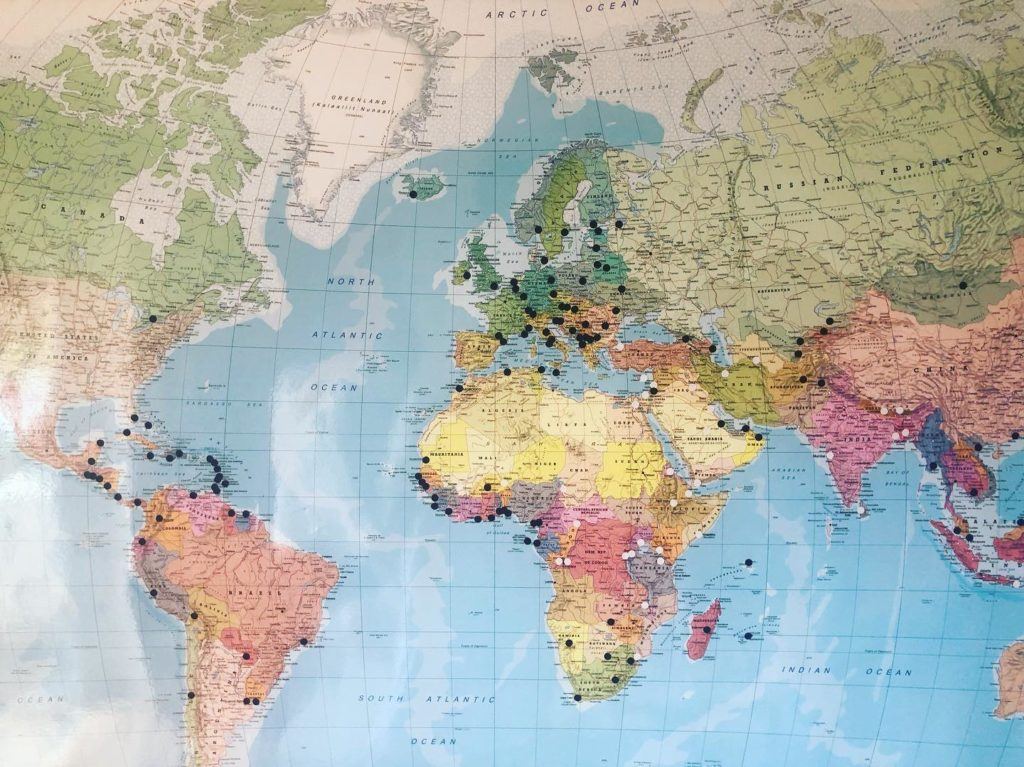
I didn’t want to go and do this record and then have the wrong number. So that took a little bit of time and understanding. In that two year period, three of those countries changed their name. There was a lot of confusion with that when we were talking about booking flights. Then I went to a travel agent and I said can you plot me a route to every country in the world, that’s going to be the quickest because we needed to do this as a record.
They were helpful on paper. They put everything together. I thought, yeah, that’s brilliant. Then you look at it in more detail and see I can’t go from that country to that country, because the flights just don’t exist. You can’t go from that one to that country, because it’s impossible politically because they wouldn’t allow you in. I can’t go from that country to that country next, because it doesn’t make any sense geographically. Sometimes there are countries where there are so much uncertainty and volatility within the politics that you shouldn’t do them one after another because you then screw up all of your flights.
We’re trying to book every single place at one go. Then if one of them goes wrong, that’s it gone. So we had to be really careful with that. It was a long two years I dedicated all of my time to make sure the planning was together.
A great friend of mine called Jeff Smith, who has a great nonprofit company called Big Moose. I went to see him and his family over dinner one evening, I also met him when I met Kevin in the desert, by the way. I said I’m going to do this thing for Kevin for prostate cancer. And he said to me, Well, you’ve got to find somebody to work with you that will be an assistant or be a manager in some way. You can’t do all of this yourself.
Team Effort
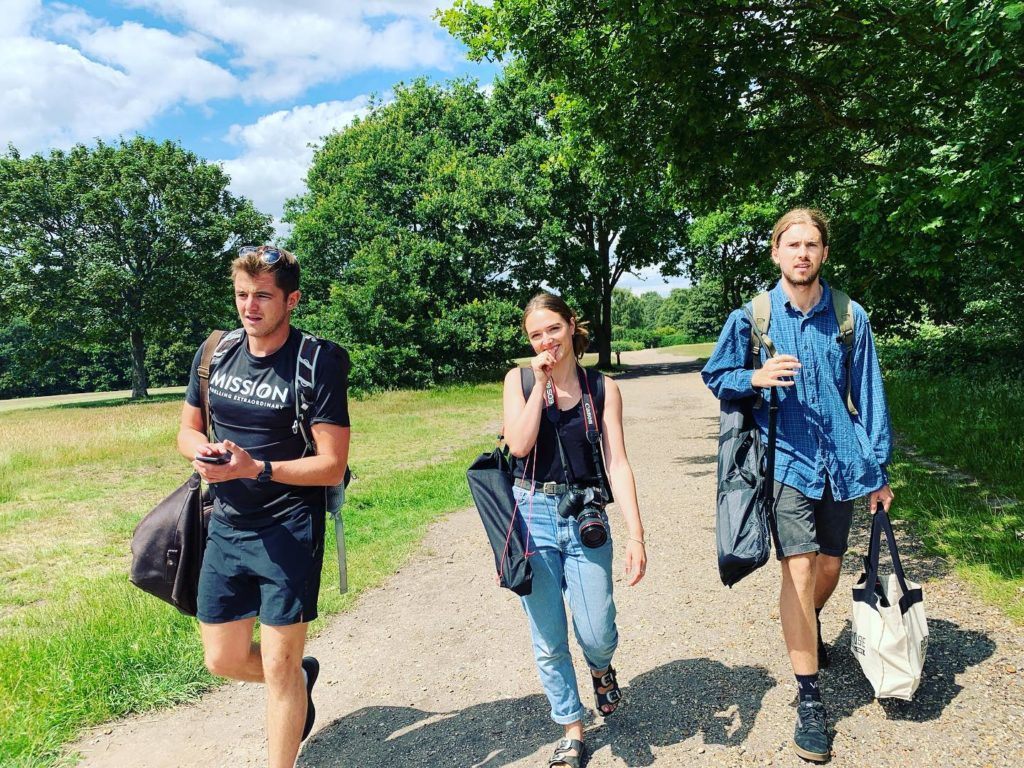
Over the two years, we grew from me planning it for about nine months, to the remainder of that time, having built up a team of about 19 people before we left. Everything from psychologists, nutritionists, security advisors, everything. I felt like I’d thought of every angle and we could do this well.
‘Now having done it, it’s like, I had no idea what I was doing because I had no idea what I was doing.’
If I was to do it again, I would change quite a lot about the project and yet we still managed to finish it.
My parents actually ended up being huge parts of the journey, which wasn’t the plan. I traveled on my own and I had to rely on somebody to make sure all my flights were linked up. I thought that you would have the whole schedule from day one, and you then go from A to B to C to D and finish it.
That went out the window within the first three weeks, I think. We had 60 odd cancellations, there are all sorts of wars going on in different places. There were visas we didn’t get. I had to go through nine passports because of the sheer logistics of having access to countries.
Those two years were probably logistically as difficult as the actual two years of doing it because there was so much uncertainty and then it just kind of spiraled from there until I just about clinched it in November.
Oli: Were there times where things just didn’t go obviously according to plan did you think, Okay, instead of going to that country, I’m gonna go to a different one?
Nick: Yeah, there was a lot of that.
I spent a fortune on a nice snazzy website and having a tracker and everything like that. That’s just basically died because I was in Africa where the tracker wasn’t working. Mostly it was my first leg of Africa. So I did North America. Canada was country number one and went basically south from there until I finished all of the Americas. Then after that, that’s when things got really tricky. Countries were either in war or airlines we’re going bust.
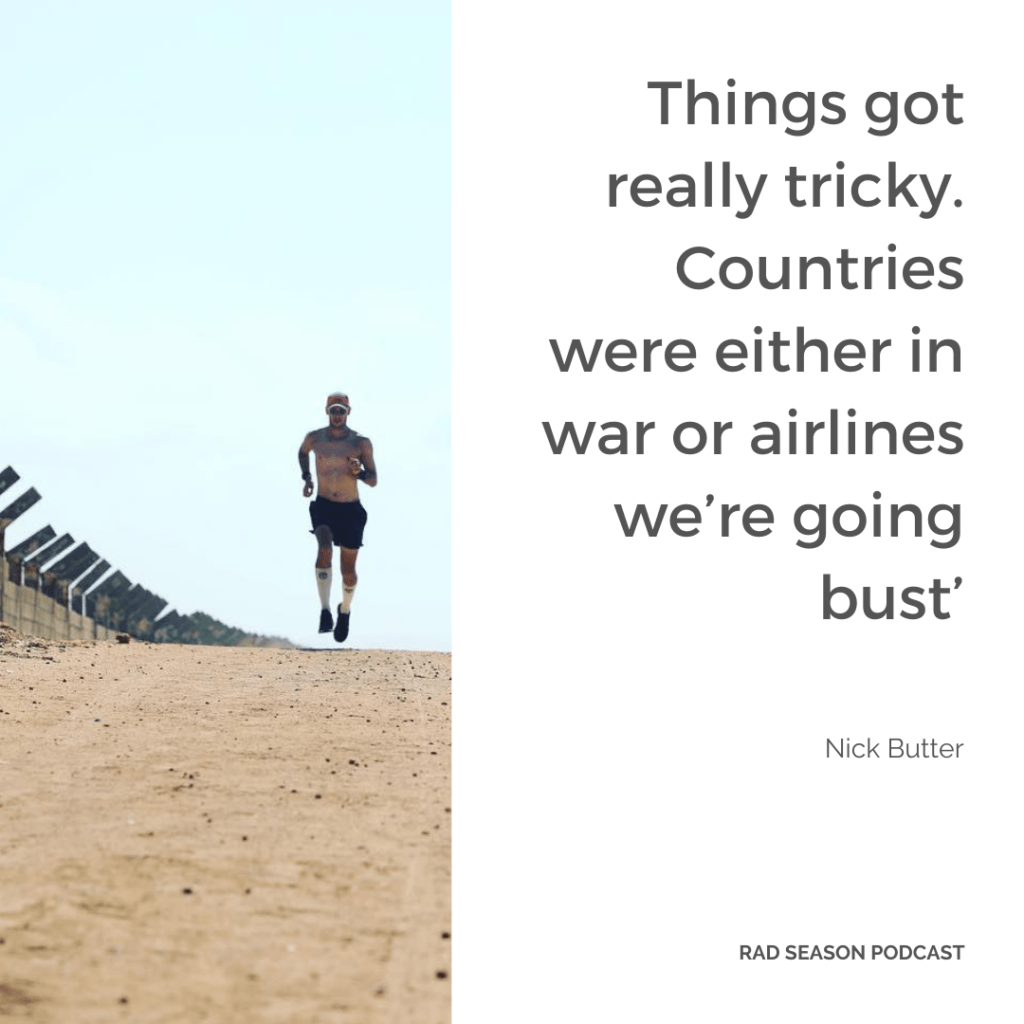
We have that quite a lot more than you’d imagine. So places that used to fly from A to B that just didn’t exist anymore. So we’d have to go somewhere else. Frequently, I’d have the phone call saying we can’t get your designated flight to such and such because that city is currently under siege or there’s no UN support, or the person that we’ve had contact with says you should go there now or, by the way, your flights canceled can you get to the airport now, like immediately when waking up at one o’clock in the morning to get to the airport and all that sort of stuff. That happens.
The reason I’m not giving specific stories is that it happened virtually every week. If not, more than once every week.
‘Things just never went to plan, which was the new plan, you just kind of have to adapt to it.’
Eating During the Trip
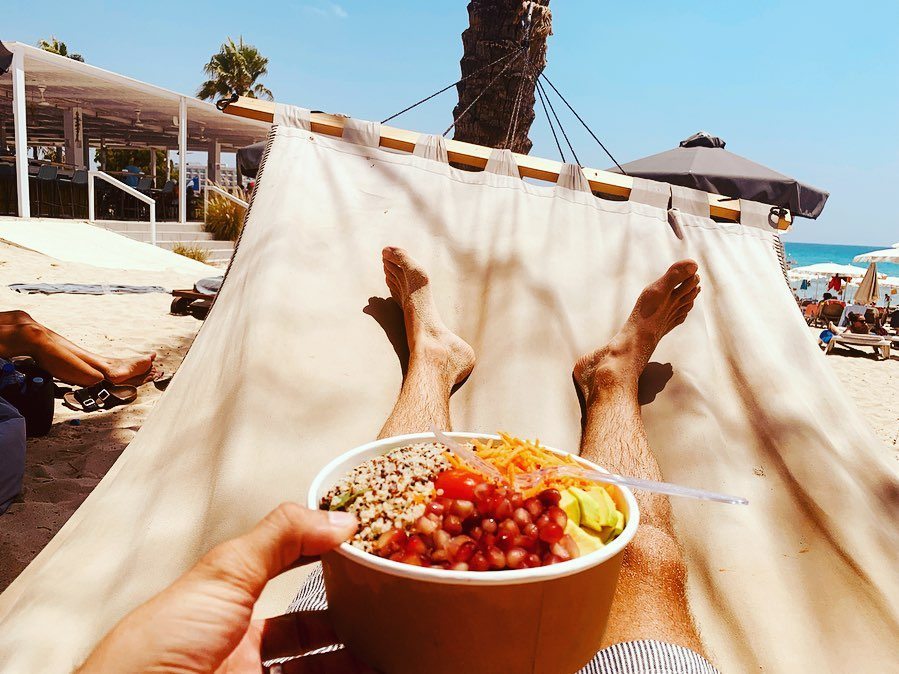
We have this beautiful spreadsheet that has so many lines. I had to understand when I was landing what time it was for me what time my body clock was saying it was going to be, what time in the country versus the last place. How many miles I was traveling, so I understood if I was going to have a four-hour flight or a 20-minute flight, that kind of stuff. So I knew whether I needed food on the plane.

I think there were 80 days out of the 674 days where I didn’t have food at all. Not 80 days consecutively, but individual days where I didn’t eat anything, simply because of my logistics within the day meant that I was not easily accessing food. So if I was leaving at four in the morning in a hotel in somewhere in I don’t know, let’s say Rwanda, no food easily accessible, get to the plane. Don’t give your plane food like many other places, therefore, that’s gone. Maybe I can have a Mars bar at the airport if I’m lucky. Probably not. That’s gone. And then by the time I get there, I either need to go to sleep or run a marathon. Then before I know it, the end of the day has happened and I haven’t eaten. So that sort of stuff came and went.
‘It was a kind of a concoction of things that went wrong all the time.’
Organised Events And Marathons Around The World
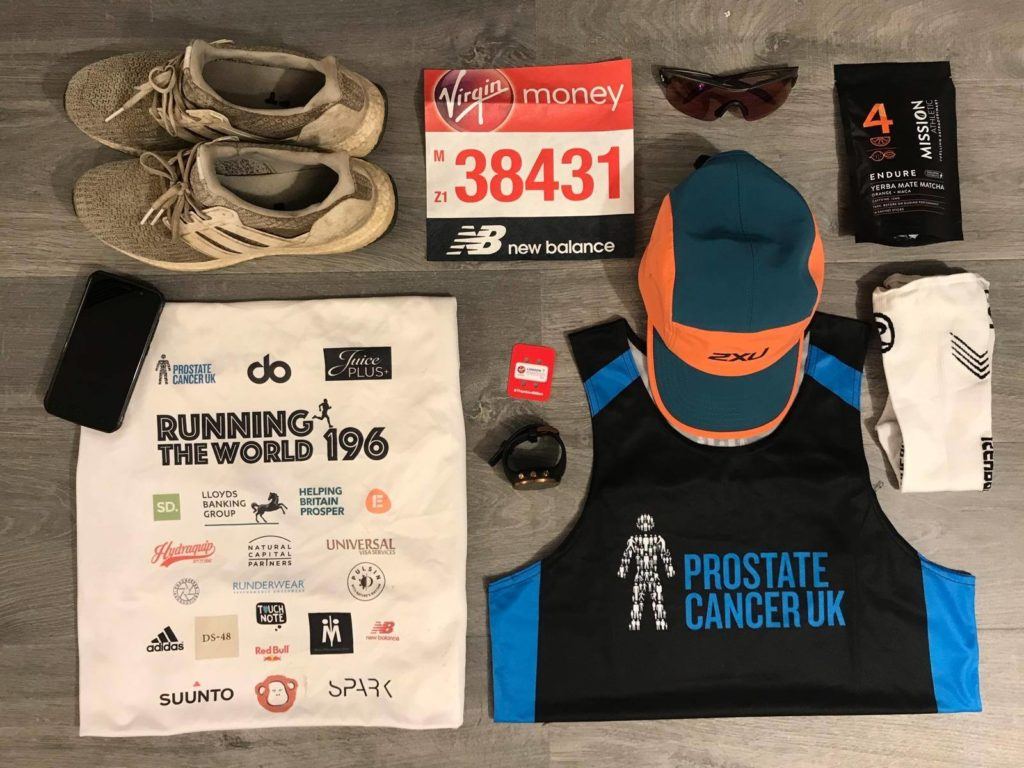
Oli: Did you have any dates that you had to make, any organised events or races where you were committed?
Nick: That’s a really good point. And that was a big pain in my life because there were some key dates.
The reason why we decided not to go and do all official marathons right at the very beginning was:
i) Number one. There’s a lot of countries without official marathons, so it kind of felt silly just doing most of them, and then there’s just some that aren’t.
ii) I’d already done before I left 500 something marathons already. I’ve done lots of official places, official races all over the world. I was over the whole organized kind of monetizing the whole marathon concept. I thought, actually, I’d rather just go and run in a city and meet a load of new people, The idea was I was going to stay with local people. They’ll show me around, and I’d get to experience it for real as opposed to a mass race which in my opinion, isn’t the best way to see a city in its authenticity.
So we decided to just run our individual routes with people helping us and it turned out to be one of the best bits of the trip. I always say that the people were the best thing about the journey.
I wouldn’t have had that experience if I ran organized races. But there were a handful of races. For example, North Korea, one of the only ways to access North Korea, as a Brit is to go and run the official Pyongyang Marathon. And that’s on the 8th of April.
In April, I was in South America. My journey from Peru to North Korea, and back again, was to finish off South America and go to Ecuador was 11 flights over six days. I did three marathons in three countries. And you know, you’ve got running it on one close to the equator, in Ecuador, for example, near Peru. Then you’ve got snow in North Korea.
So you’re absolutely right, those key events really did screw with the timeline because it was like, Oh, he’s doing South America now then all of a sudden, I’m going to go to North Korea and then coming back again and obviously getting into North Korea isn’t easy, either. So all of that stuff was quite stressful.
I did the majors, that was quite important to get those done because I thought, well, if I’m going to run around the world let’s get the majors in. That caused more headaches and more harm than good, really just because of the logistics.
There was another handful, half a dozen dates that we had to hit in order for things not to seriously go wrong.
Running Schedule
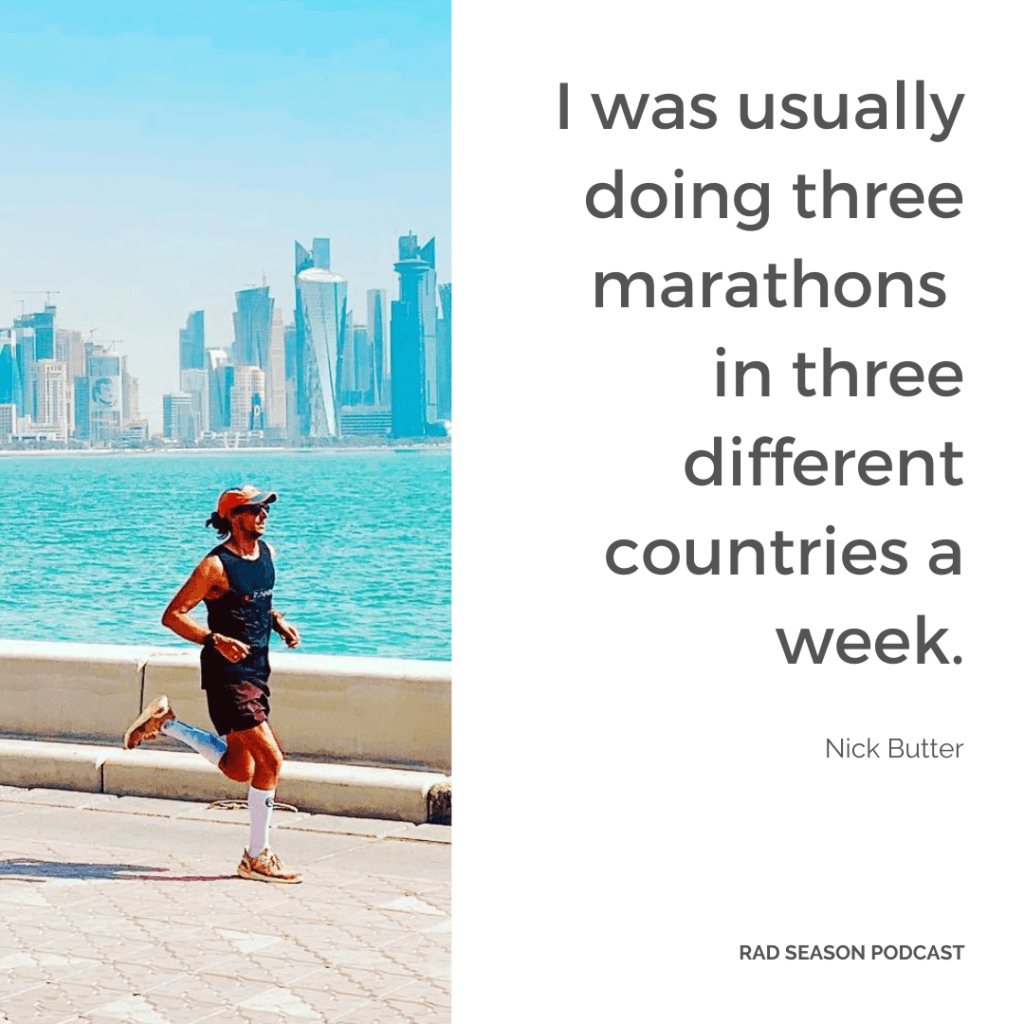
Oli: Looking at the logistics to like we’re saying with everything changing and then sorting out nutrition and resting. When were you actually running was it every third day? What was the running schedule?
The average throughout the whole project, I was running every 2.4 days, to be exact, but also you can’t have half a day. On the whole, I would say 60% of my time I was running every other day.
Then there was a group of countries about 10 or 12, maybe 15 countries that I wanted more time in. And those countries, the places like South Africa, the US, Peru, there were a few more that I wanted more than just a couple of days. So I’d stay for five or maybe eight days sometimes. That would always be planned around waiting for passports to be delivered or waiting for visa access, or to give my body a break. So from a seven day week, I was usually doing three marathons in three different countries.
But sometimes that would flex the five at the worst. And sometimes it would be just one if I was on one of my mini-breaks if you like.
The First Marathon of the Challenge

Oli: You were gone for so long. There must have been times where you were sick or just mentally fatigued and you couldn’t do it, but you kind of had to do it, right?
Nick: I had that quite quickly actually.
Again, this is kind of another bit to the story, which I quite liked but it was incredibly foolish of me. I broke my ankle in October before I left and I left in January. So it’s late September, October. I realized running that first marathon in Toronto in Canada, which was minus 25 degrees by the way, it was in a torrential snowstorm as well, which I wasn’t expecting.
I ran that marathon and having not run a full marathon distance for four months before, which for me, was unheard of in my entire life. I was always running marathon distances at least once a week.
Throughout that period, for two reasons. Because of my broken ankle, I was resting. The second reason I was in this mad panic of making sure everything was organized. So I kind of just forgot to run. I got there and I was like, Oh crap, I’ve actually not run this distance for nearly half a year, four and a half months.
Then from there, it snowballed into a kind of a nightmare of me fearing for stuff. Then I started to enjoy it when I got through like a curve, you know, I was struggling and then my mind kind of caught up and I was in my rhythm.
Things just got difficult because of places like Yemen and Syria, and then kind of just really, really tough as the stress towards the end of the trip happened because the last thing we wanted was to get to 195 countries. Then the last country denying the access or something terrible to go wrong, that meant I can’t run it and the record would be ruined. For example, a global pandemic, which fortunately didn’t happen at that point.
Running When Sick
So, and in terms of getting ill and that kind of stuff. I had 22 different periods of food poisoning, which is not good over two years. I was eating pretty much everything I could get my hands on, which meant I was having many marathons when I was almost ping-ponging from one bathroom to another, just making sure that everything’s okay. Most of the time it was pretty horrendous.
Then there were the times when I woke up in Bangladesh. I didn’t even remember what number it was, but it was very far down the line and I’ve got so used to it and I just stumbled out of bed. Just imagine you have a horrendous flu or had a kidney infection. I had food poisoning. I was feeling beyond rough and I just kind of rolled out of bed and there were 15 people, locals that wanted to run with me in the lobby downstairs. I got down there and went guys I’m really rough.
But let’s just get through this and I threw up every single mile. Then I went to bed, got up the next morning, flew to my next country and did it again. That kind of stuff was tough.
Overall, I think in terms of what we’re talking about with my body not liking what I’m eating or illness and sickness.
Mental Health
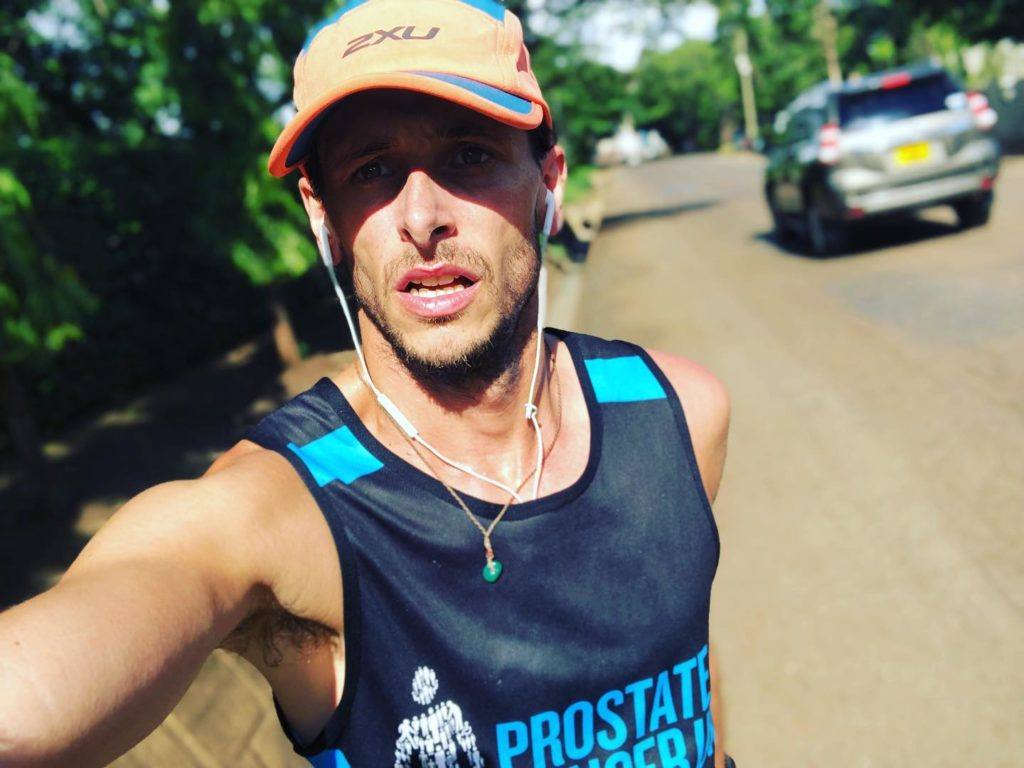
‘The fatigue of having to rely mentally on my own thoughts and my own opinions of should I do this? Should I not do that? That was quite a struggle’.
When you travel with somebody else or when you’re working with somebody else, or even if you’re playing sport with somebody else, you can kind of go, should we do this or shouldn’t we and have another person’s opinion.
Traveling on your own if somebody said to me, hi, mate, nice to meet you. Let’s go out for dinner now, or I’ve got this great place to go and show you or let’s go and run here together. I have to put my trust in a complete stranger.
The problem with that is that I always have to double-check stuff. I have to be kind of situationally aware that I’m not getting myself into real trouble, which happened, I got close a lot of times. It was ultimately because I was so tired, that I wasn’t making all of the right decisions all the time. Things like going to the right airport.
There’s a couple of instances where I got a taxi to the wrong airport in a city because I was just tired. In normal life, you would double-check where you’re going. I’d just get in the taxi, fall asleep and wake and I was at the wrong airport.
So that kind of stuff. But yeah, the list goes on.
Running With Locals
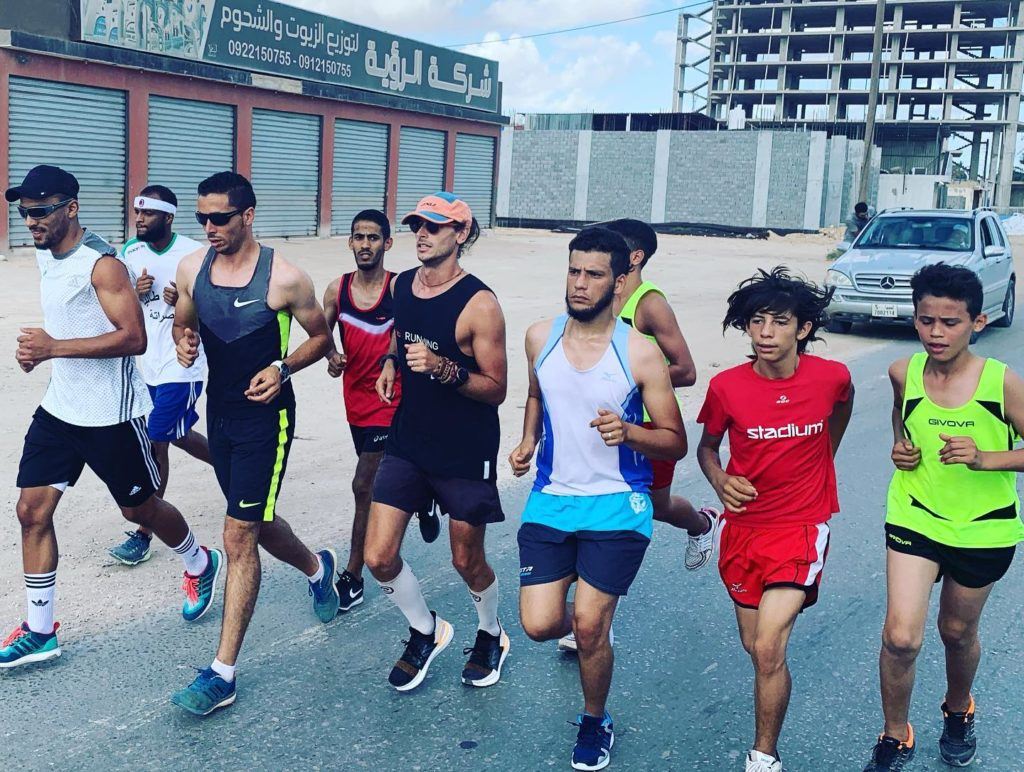
Oli: When you were doing the runs, the countries that weren’t organized races, were you running with people? Did you have someone on the ground that would meet you wherever you’re going be staying and they went with you?
Yeah, so my team did a very good job. So between my parents, my assistant, lots of my team, they linked up somebody, a contact in the country that I would have. I don’t think there was any country that I went to where I didn’t have a contact, whether it was somebody behind the reception desk, or whether it was a family I was staying with, or whether it was a big group. Like in El Salvador I had 1000 runners with me. It ranged from virtually nobody to thousands of people that had been organized and through the course of the journey, I was kind of having a couple of people meet me and we’d go and run together. As I got towards the end, I was having races organized specifically because I was arriving at that time.
Countries would go Nick’s arriving on this date, let’s arrange a race and I’d have things like medals with my face on and massive banners and cheering stations it was incredible, like absolutely amazing.
That was also another bit of pressure, you know because we publicize where we will get to be and when. When those didn’t happen, then we’d let some people down. So I was running with people more or less, I would say, more or less every time. Whether sometimes it was only for a mile or two.
There are very few people that ran the whole way with me but they kind of tag-teamed really.
The Running Community
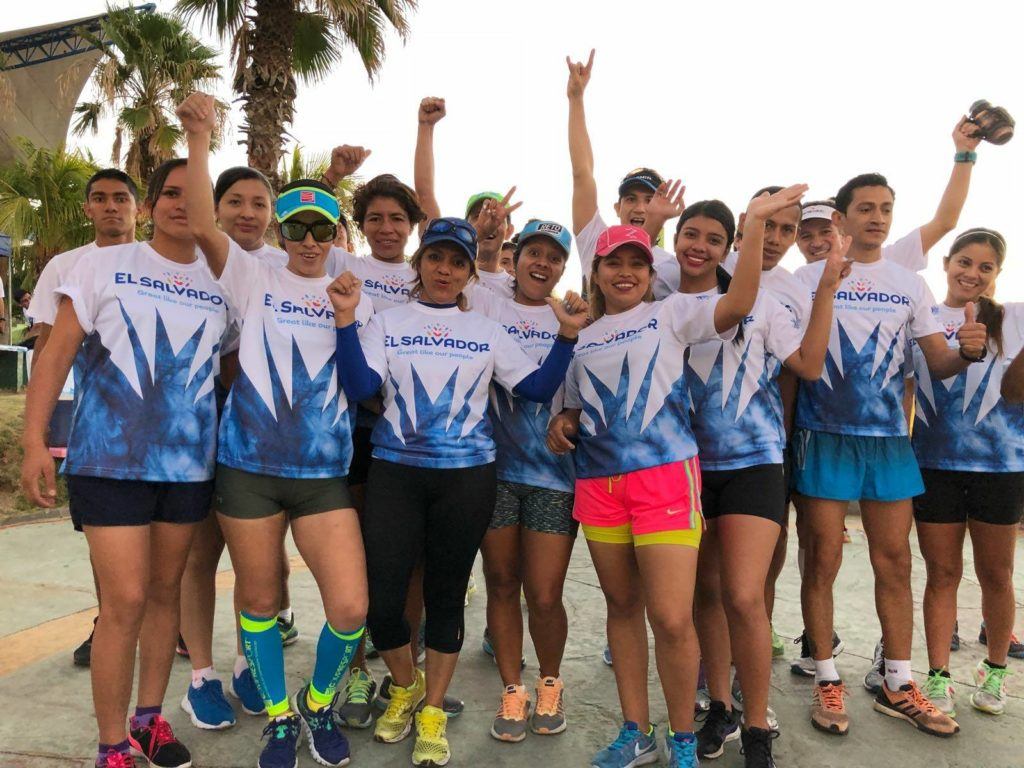
Oli: Was there any standout country. You said it was the people that made the trip? If you had three countries what would you pick?
‘I could probably name nearly all of the countries that the people were the standout part’.
Because I think if you go around, imagine there are no people on the planet and you travel around it beautiful and peaceful and lovely. But actually, all of the interactions I had and all of the memories are all to do with the amazing people I had spoken with.
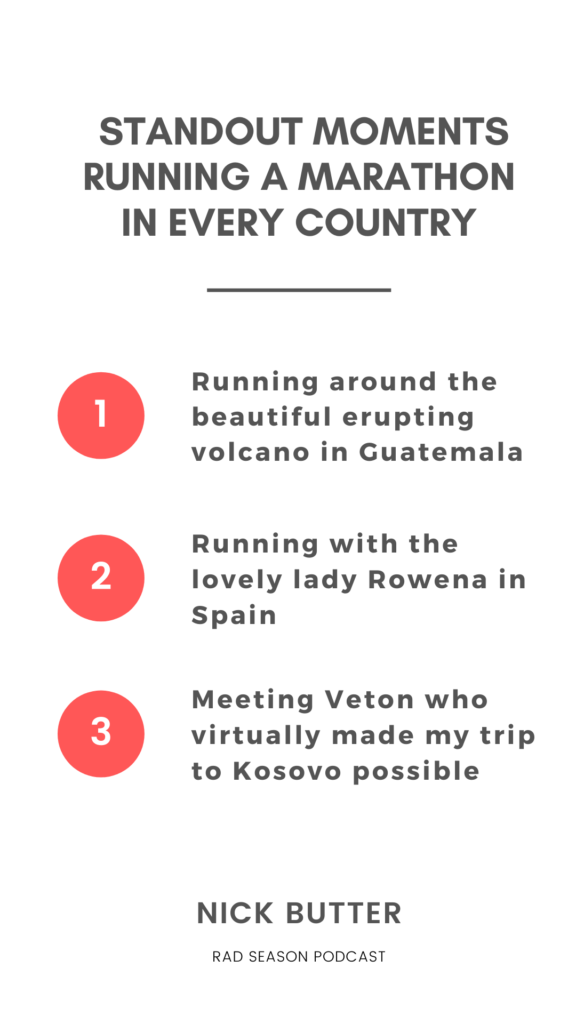
I suppose Guatemala is one of the great countries that I love because of the people. I ran around this beautiful erupting volcano in the outskirts of Antigua, and I met a bunch of people there. I have now run around in nearly every continent with one other guy who is also called Nick. He runs the Impact Marathon Series, really great group marathons all over the world.
He just rocked up at the hotel, saw it on Facebook and came and run. Since then, he organized the run in Rwanda with me. We meet and we’re really good mates now. So that was something that was quite near the beginning of the trip there.
Another one was in Barcelona, where a lovely lady Rowena was listening to the Chris Evans show. Two o’clock in the morning when I was recording this. It was morning for the UK. Back when I was in Barbados, and Rowena happened to be listening in Spain, and then got in touch with my team and said, when Nick comes to Spain he can come and stay with me. What she then did is she offered to them drive me from Spain to Andorra. We then ran in Andorra, with some contacts she had there. Then she also took me to Nice as well. And so this amazing woman linked three countries together. To be honest, that story happened many, many times, I guess.
Say Yes
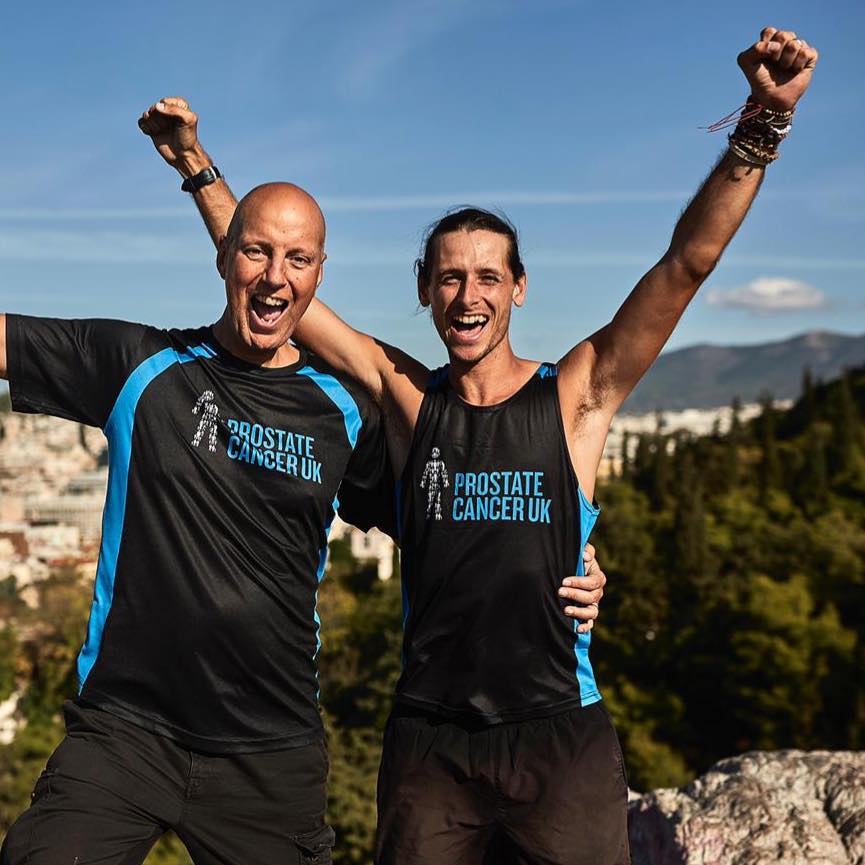
The other little story, which I really love, and it’s a typical display of the benefits of saying yes to stuff and talking to people, when you may not necessarily when you may not be in the mood to talk. Lots of people will sit on the tube or sitting on a train or a bus and on an airplane for that matter, and not talk to each other. I always make a point of speaking to everybody, because there are amazing people literally all around you.
I chatted with this guy at the end of Silverstone half marathon around the Silverstone Racecourse in the UK, this was about five years ago.
A guy called Veton. I just chatted to him it was raining we huddled under a hangar got chatting and he said I’m originally from Kosovo. The idea of this trip didn’t even exist but I said yeah if I’m ever in Kosovo running I’ll look you up. I didn’t think that would be happening. Obviously. We hadn’t said a word at all to each other. We hadn’t messaged we hadn’t emailed. We haven’t said a word to each other. It was just passing like this. This looks like a great guy to know.
I then rocked up in Kosovo and he met me at the airport. He’d been in contact with my team. I didn’t know about it. He met me in the airport and later I found out that he used to work for the UN.
I now employ him as my assistant. He got me access to countries that I just would never have access to. So through that one little conversation, he virtually made that trip possible. So it was little things like that, which were just mind-blowing to me.
Scary Moments
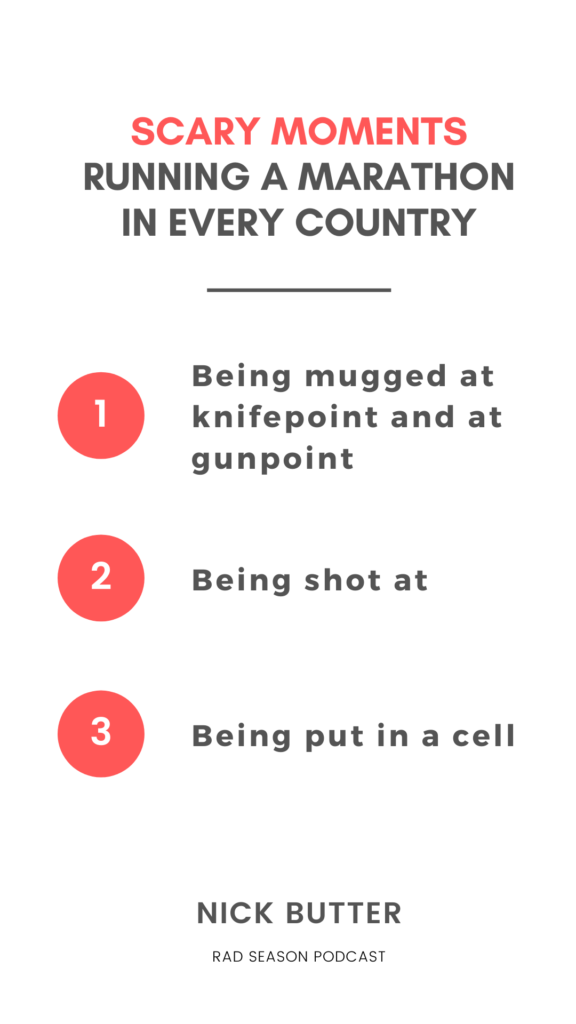
Oli: That’s cool. Presumably, there was a lot of crazy stuff that happened. Is there one standout moment that you thought okay, this is nuts.
Nick: Yeah. And there’s a lot of those.
– Being mugged at knifepoint and at gunpoint
– Being shot at
– Being put in a cell
– Having very close calls with big animals
– Being hit by a car
– Having broken bones
Whatever could have happened, happened apart from me dying, which I’m very grateful didn’t happen.
There were all sorts of things that were just nuts, but I think the one that stands out the most for me was a really scary moment when I was going over the border from Oman to Yemen.
I needed to go as it was quite close to the end of the trip. We hired a guy to drive me through the Omani mountains at night to get to the border. We were supposed to be staying in the hotel. The hotel turned out to be just a building site. That building site was terrible. It was pretty scary.
‘There was beautiful mountains, camels roaming around and gunfire in the distance.’
We went through these checkpoints as you do. Very strange checkpoints, lots of military, lots of dogs, lots of weapons. I was pretty scared because not only for my life but for kind of being locked up. I didn’t want to be in Yemen and be locked up for doing something wrong. That’s scarier than being shot in my opinion because you know, people have been locked up for pretty much nothing and haven’t seen their families for a long, long time. I didn’t want to ruin the trip.
It happened that we were going over the border and there was some commotion and the driver was shouting with the officials and I didn’t know what was going on. It turned out that the driver was attempting to smuggle drugs into the country without me knowing about it, and kind of used me as an excuse, use me as a mule, if you like. From that moment on the border of Yemen, on Yemeni soil with massive AK’s and lots of shouting and being dragged out the car and it was scary. It was really scary.
Fortunately, it ended with him having to give over everything he was trying to smuggle in and then we got through. But then of course, I had to worry that what would happen when we try and get back? Are we going to be allowed out or are they going to extort us what’s going to happen? Fortunately, we got out with it. It was two o’clock in the morning, it was dark and everybody was menacing. So yeah, it was pretty scary.
Travel Advice

Oli: Now looking back, you’re saying if you were going to do the trip again, there’s so many things that you’ve learned. What advice would you give people who are looking to travel to these kind of places?
Have a backup plan
Nick: I think the main thing is to say yes to it, and to definitely travel to all of these places. I get a few messages from solo female travelers who are scared to go to some places and in some places, rightfully so, because traveling alone anyway is not particularly safe. Even in Western society in Europe, for example, things can go wrong, but it’s just about having backup plans. I always had my trackers with me always had that kind of security level there.
Trust your instincts
There’s also trusting your instincts and stuff.
‘I think the biggest thing I learned about travel is it opens up so many great joyful moments.’
Whether it’s seeing a sunset, whether it’s having a conversation with somebody.
I was chatting with a guy when I was running in Bosnia and he’d seen the Bosnian War he’d fought he was this old man, it was just the most an enlightening conversation. I would urge every single person, I’m not on a rampage to get everybody out running but at the same time, I do think that’s a pretty cool way of seeing the world.
Get out of your comfort zone
Just being able to get a little bit further out of your comfort zone and experiencing that buzz of landing in an airport where you can’t read any signs. Because it’s all in a different language and you haven’t been prepared. You’re in shorts when it’s torrential rain, and it’s cold and all of that stuff that is inevitably going to happen when you travel is I think the best stuff. It’s kind of all the serendipitous moments that you remember forever.
I suppose to top that question off, So my first year, obviously, there’s nearly two years of traveling and I got back a few days before Christmas to wait for a new visa and had three or four days in the UK, had some Christmas dinner with my family and on Christmas morning I had messages from people that had met from around the world.
I did 100 countries, 100 marathons in 100 countries in year one. And on that Christmas morning, I had 61 different people from 61 different nationalities messaged me on Christmas Day wishing me happy Christmas. So I think, you know, if that’s not a reason to travel, what is it’s just so incredibly grateful to have that opportunity.
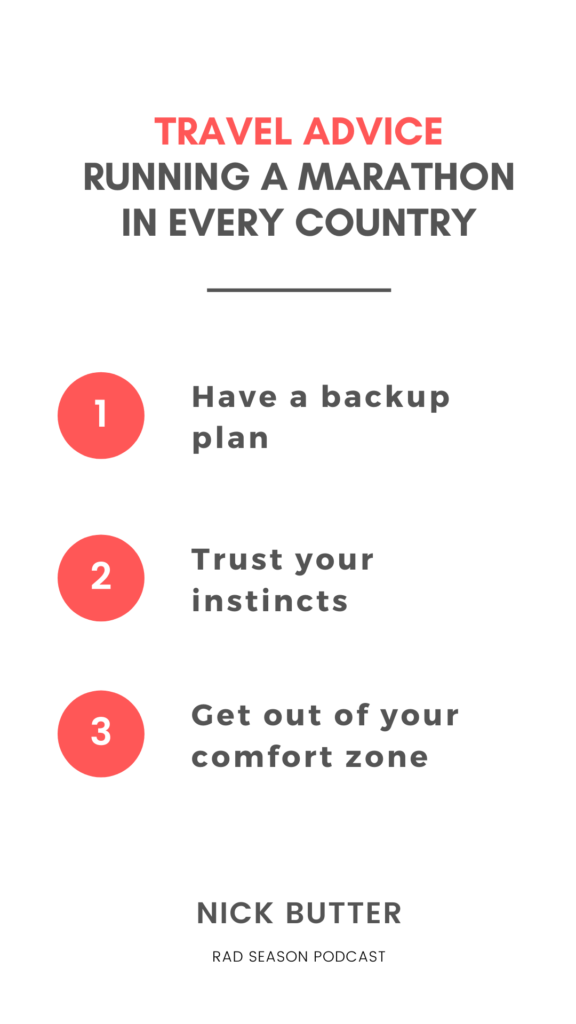
Oli: Especially with what’s going on now you know?
Nick: COVID I know and everything that’s happened. I mean, in our lifetimes I hope that it never happens again. But I can’t imagine anything ever coming close to the world being shut down and not just not being able to go to the pub or not being able to see your family or your neighbors or go outside.
Especially living in a van during the lockdown and trying to keep isolated, driving down the road. And not seeing anybody for two or three hours was absolutely surreal. It definitely felt like an apocalyptic film. There was a whole extra level and I’ve got my theater tour, my speaking tour, which is reigniting speaking in schools and businesses and venues around the country for the next year when that starts up again. I’ll be talking a little more about the kind of privilege that I have to be able to have done that.
Also the urge to try and get other people to do something similar in the sense of not just being in your backyard your whole life. Just go that little bit extra and see what it’s like and hopefully the world will open up again and people will have appreciated everything that they’ve got.
Running the World Book

Oli: you’ve just got your book running the world. Do you touch on the privilege side in the book as well? Or is it about the journey?
Nick: When I was writing the book, I wrote about 150,000 words too many. My publisher said, you know, you’ve got this many words, you can’t go over them. Inevitably I did because I’ve got too many stories.
But yeah, it touches on a little bit of background of the journey, but also a lot of my philosophy and the privilege of my experiences in each place. I try not to touch on the classical things within each place, because you can read those in any book. It’s more about my feelings that I had in each place.
A classic example is being in Syria and expecting to have this scary experience within Damascus. I ended up running with the under 19 female national football team. You know, it’s bonkers. Those kind of stories is what the book is about. It’s sharing the journey, my experiences and hopefully giving everybody a nudge.
I don’t want people just to quit their jobs and travel around the world, but it’s something that I would recommend, you know. So I hope that what will leave people with the feeling of when they finish reading.
Next Running Challenges
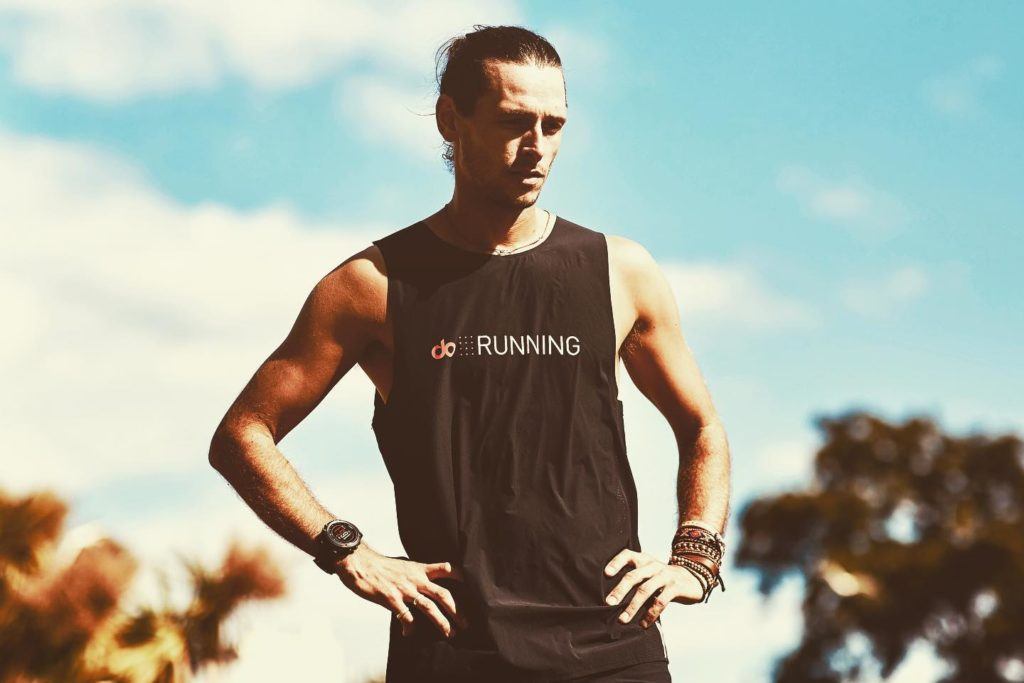
Oli: Once you’ve done the speaking tour, what’s next? You’ve done this, what’s going to top that. Are there any other challenges, whether it be running or something else you’re working on?
Nick: Yes. So between now and the end of next year, we have the speaking tour and listed amongst that we have six, maybe even seven or eight mini-challenges.
– Running the length north to south of Malawi
– Circumnavigating Iceland
– Circumnavigating Bali
– Running Land’s End to John O’ Groats
– Running the Camino Way
Those kinds of things are smaller, they’re one country at a time.
They’re not overly endurancy. I’m going to try and do them quickest and try and break some records but I’m really doing that as part of training for the bigger picture, which is for what’s coming next.
So once the next 16 months has lapsed, that’s when things get a little bit more serious for me and then a year after that, again, is when I’m taking on my next big expedition, which I can’t tell you exactly what it is because I’ve been sworn by my sponsors. But it’s going to be a lot more running.
I can say that it is a lot and it’s North America based. It’s not just running in every state, it’s not something like that. It’s a little bit unique. It’s not been done before. It’s going to be hopefully another four world records and a big world first, it’s the world first I’m most excited about.
I’ll be releasing the details probably by the end of the year. I’m just trying to keep it under my hat because there’s a lot of stuff that has to be planned and I also have to definitely commit to it before I talk about it.
Oli: Would you say it’s just as ambitious as running every country in the world?
Nick: Endurance wise physically on my body I think I would say it’s about 100 times harder what I’m about to try and do. It’s definitely going to be the hardest physical feat I will probably ever take on.
In terms of logistical, it’s gonna be difficult but hopefully not as challenging as the last one.
Oli: If people want to follow you and keep in contact with what you’re up to and your journey, what’s the best way?
Nick: My website is obvious the hub of everything nickbutter.com
My Instagram nickbutterun is the best way forward. You can see all of the stories and all of the little challenges that I’m setting myself every month.
Things like this month I’m doing 600 miles and 10,000 push-ups, which is a stupid challenge because I’ve never done them before and it’s horrible. It’s a nice little challenge to keep me on my toes and it’s a good way of knowing where I am in the country or where I am in the world. So if people want to come in and run with me find me on Instagram and say hello and hopefully we can do stuff together.
Oli: Awesome, Thanks for coming on. It’s been great to chat and I hope everything goes well when the talking tour starts again and good luck with planning everything for the new challenge as well.
Nick: Thank you very much Oli. I have to rope you into doing a few miles with me on the next challenge. Take care mate. Thank you so much.
Watch the video:
Missed the last episodes? Check them out!
Episode 11: Dark Tourism – Tommy Walker
Episode 12: Bucket List – Robin Esrock
Episode 13: Wisdom of Ageism – Chip Conley
Last updated on Sep 11, 2020
Have you subscribed to our Newsletter or Podcast? Listen to us on Apple Podcast and Spotify and follow us on Facebook, Instagram Twitter and YouTube.
Accommodation near Newquay, Cornwall, UK
Rad Season is providing you with rentals and hotels at the lowest prices available online. Book your stay near Newquay, Cornwall, UK using the map below!

